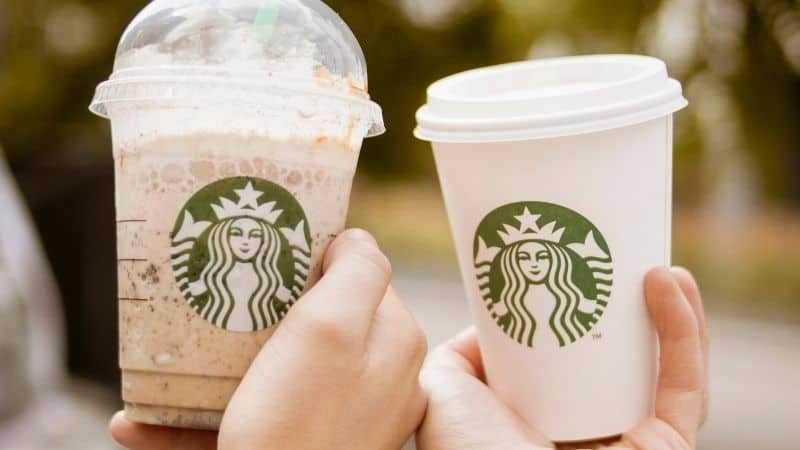Most people start their day with a big cup of coffee, and many are willing to brave the long lines at their local Starbucks. Starbucks has received a lot of attention for its admirable treatment of employees and corporate ethics.
But what about its beverage and merchandise products – does Starbucks manufacture itself or source everything from sellers? Where does Starbucks get its products from? Here’s what you need to know!
Key Takeaways
Where Does Starbucks Get Its Products From In 2022?
Rather than produce or manufacture its own, Starbucks outsources many of its beverage and food products internationally, including its famous coffee beans as of 2022. The company stresses the importance of ethical and sustainable sourcing, partnering only with suppliers who meet its rigorous standards. Companies like PepsiCo, Nestle, Dean Foods, and SROriginals supply Starbucks with food and beverage products.
If you have more questions about Starbucks, like where it gets its coffee beans and breakfast sandwiches from, even where some of its milk products are from, keep reading!
Where Does Starbucks Get Its Coffee Beans From?
Starbucks gets its coffee beans direct from the source, the area between the Tropic of Cancer and the Tropic of Capricorn, known as the Coffee Belt.
That said, these regions (there are multiples, on multiple continents) have the perfect climate conditions for growing the best coffee beans in the world.
Further, the regions are located in South America, Africa, and some Asian-Pacific countries. Moreover, the best Arabica and other coffee beans can be found in:
- Brazil
- Columbia
- Guatemala
- Kenya
- Mexico
- Saudi Arabia
- Tanzania
Because of its geography and proximity, you might assume Starbucks gets most of its coffee from South American countries.
Surprisingly, it actually sources a lot of its coffee from the Asian-Pacific instead.
No matter where the beans come from, you can be assured that Starbucks is not sourcing them from shady farms that exploit slave or child labor.
Further, Starbucks created and adheres to two separate ethical codes, CAFÉ (Coffee And Farmer Equity) and CSG (Coffee Sourcing Guidelines).
Where Does Starbucks Get Its Syrups From?
When you’re as successful as Starbucks, you can’t use any old grocery store syrup for your drinks.
Instead, the world’s largest coffeehouse chain has its syrups custom-made.
That said, the food manufacturing giant Nestle (of Nestle Tollhouse cookies), whose syrup brand Fontana supplies for Starbucks.
However, some people think or theorize that Starbucks uses the famous Torani syrups; but, that’s not the case.
Where Does Starbucks Get Its Tea From?
Like its Fontana brand of syrups, Starbucks also sources its Teavana tea from Nestle.
That’s right; those deliciously fruity and floral flavors come from a subsidiary company under the Nestle company.
What’s more, you can actually buy Teavana tea in grocery stores, so if you want to recreate your favorite Starbucks moment at home, you can!
Moreover, Starbucks and Nestle teamed up in 2018, which was a brilliant move for the latter.
For example, having its products sold in Starbucks locations gives the Teavana brand instant name recognition when customers see it in their local grocery store.
Where Does Starbucks Get Its Food?

The food items I found sourcing information for are a delicious morning staple: the Starbucks breakfast sandwiches.
That said, these are made by Premium Brands Holding Corp., based in Canada but with locations in the US, too (and possibly plans to open more American plants).
Further, the two companies have been partners since 2010. But in 2015, Premium Brands began supplying breakfast sandwiches for Starbucks, which started to gain notice.
So, while Starbucks breakfast sandwiches might not be homemade in-store, Premium Brands Holding Corp. still provides a delicious product.
Where Does Starbucks Get Its Cake Pops From?
Every time you purchase a tasty cake pop from Starbucks, you’re actually supporting a minority-owned company called SROriginals.
The Steven Charles dessert company, or SROriginals, is a wholesale dessert supplier in Aurora, Colorado.
On its website, it also touts the fact that women hold three out of four executive-level positions.
Finally, if you want some of the Starbucks cake pop goodness at home, SROriginals has a retail store online, at TickleBelly.com, where you can purchase the very similar “cake balls.”
Where Does Starbucks Get Its Milk From?
One of Starbucks’ milk product suppliers is a name you might have heard before: Dean Foods.
Now a subsidiary of the cooperative Dairy Farmers of America (after filing for Chapter 11 bankruptcy in 2019), Dean Foods provides milk and creamers to the coffee shop chain.
Further, the company has done so for years and even became the sole provider to Starbucks of Silk soymilk in 2003.
Therefore, as Starbucks is known for its ability to create elaborate drink recipes and coffee beverages for the lactose intolerant, the Silk/Dean Foods partnership is significant.
Who Makes Starbucks Ready-To-Drink Products?
If you’ve ever grabbed a ready-to-drink (RTD) Starbucks coffee from a convenience store, you were supporting not just Starbucks but one other huge name in the beverage industry.
That said, PepsiCo manufactures Starbucks’ RTD line of coffee beverages.
Moreover, it makes sense that a massive company like Starbucks would turn to a major beverage company like PepsiCo to churn out huge quantities of products.
Also, Starbucks benefits from the distribution channels of a major beverage company like PepsiCo to get its drinks in stores around the country.
If you are looking to learn more, you can also see our posts on what creamer does Starbucks use, why does Starbucks coffee taste burnt, and how does Starbucks make cold foam.
Conclusion
Starbucks is the largest chain of coffee shops globally, and as such, where it sources its products can have a substantial global impact.
Luckily, many of its food and beverages, especially coffee beans, are ethically and sustainably sourced according to stringent guidelines.
